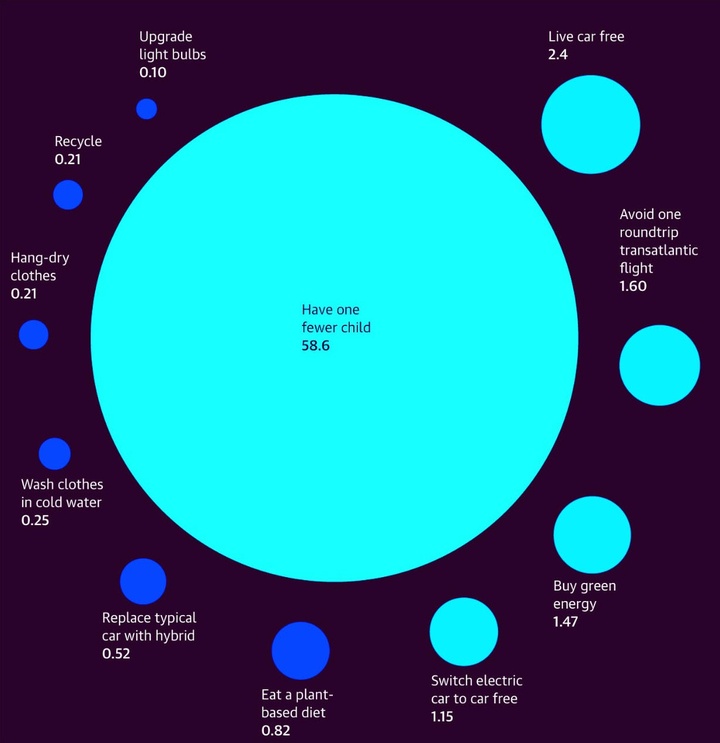
Tonnes of carbon dioxide per year saved per individual taking action (1 tonne = 1,000 kg.). (Adapted from Guardian graphic)
A few years ago, my wife was taken to task by several readers when she commented on a blogger who maintained a “minimalist” blog. Joshua Becker had just recommended a co-blogger’s story about how she was raising her six children in a minimalist way. Louisa wrote, “Respectfully, I find it surreal that you would recommend a blogger with six children. No matter how much you recycle and reuse, having six children, unless they’re adopted, is not minimalist! I don’t want to be rude, but to remain silent feels like ignoring the elephant in the room.”
I was reminded of this — and the subsequent rather messy follow-up responses and responses to responses — reading an article this week in the UK liberal daily Guardian. The story summarized a study (also published on July 12) in the peer-reviewed journal Environmental Research Letters, in which a couple of scientists quantified — in terms of the amount of carbon dioxide released into the atmosphere — the effect of having one less child versus other energy-saving measures.
Their figures vindicate what I (along with many environmentalists) have thought but have been loathe to say, that the biggest effect any of us can have on the planet is rated by the number of progeny we leave. I read a lot about humans’ influence on the world (mostly bad) and what we can do to mitigate it — you know the litany by now: don’t fly, don’t drive (or at least go electric), recycle, air-dry clothes, go vegetarian — but somehow the obvious is never mentioned. Or if it is, it’s in the generalized, remote context of those Indians and Chinese and Bangladeshis who are overpopulating their countries. The idea of us, as in the US, having fewer kids gets a pass. (Even though it takes 40 Bangladeshis to use as much energy, food and water as a single American.)
Turns out, the elephant Louisa referred to above is even bigger than most of us imagined. The figures are sobering: in round numbers, each child you and I bring into the world results in putting nearly 60 tons of additional carbon dioxide into the atmosphere for each year of the parent’s life. (Each parent gets to be responsible for 50 percent of the child’s emissions, 25 percent of each grandkid’s emissions, etc.)
Meanwhile, giving up driving a car for a year reduces CO2 emissions by a paltry 2.4 tons, while avoiding a round-trip trans-Atlantic flight (squirm) saves 1.6 tons. As for the rest, it all looks pretty minimal: avoiding meat consumption saves about 0.8 tons annually, washing in cold water and air-drying clothes are each worth about 0.2 tons, the same as recycling. Sigh. Recycling’s good. Having one less kid is 300 times good.
The paper also addressed how often the notion “having fewer children helps the world” is mentioned in textbooks and government documents on climate change: zero. Not one word in all the books they checked.
Of course. It’s hard enough to discuss evolution in schools these days, let alone the possibility of telling young people about the one really effective method they could take to take care of the planet.
July 12 seems to have been a red-letter day for this children-environment connection. The mindful aging website “nextavenue” published a story this day about the connection between global warming and becoming a grandparent, provocatively sub-titled, “Many Millenials cite climate change as a reason not to have kids.” Short on statistics, long on anecdotes, this article about “baby doomers” is still worth a couple of minutes of your time. At least to get the discussion going. As a sociologist in the story says, “I’m not sure whether the trend is growing, but the amount of conversation about it sure is.”
So … can we talk about this?
CLICK TO MANAGE